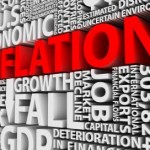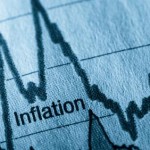By FXEmpire.com

Inflation and Prices Up in Eurozone
Inflation in advanced economies held steady at 2.8 per cent in February, with a sharp rise in energy prices balanced out by a drop in global food prices, the OECD says.
Excluding volatile food and energy prices, 12-month consumer price inflation came in at 1.9 per cent, said the Organization for Economic Co-operation and Development said on Tuesday.
The OECD groups 34 advanced economies.
Energy prices were up by 7.9 per cent in the year to February, amid tensions with Iran and broader supply worries, higher than the 7.4 per cent in the year to January. But food price inflation dipped to 3.9 per cent from 4.3 per cent.
Annual consumer inflation was stable in the United States, at 2.9 per cent, and in the eurozone at 2.7 per cent.
It rose in Germany, to 2.3 per cent in February from 2.1 per cent the previous month, stayed flat in France at 2.3 per cent, and fell in Britain to 3.4 per cent from 3.6 per cent.
China’s inflation dipped most sharply, to 3.2 per cent in February from 4.5 per cent in January.
Japan, long struggling with deflation, saw a modest 12-month rise in prices of 0.3 per cent in February, up from 0.1 per cent.
India bucked the global trend amid major economies, with inflation accelerating to 7.6 per cent in February from 5.3 per cent in January.
Eurozone factory gate inflation slowed less than expected in February due to rising oil prices.
Producer price inflation moderated to 3.6 percent year-on-year in February from a revised 3.8 percent in January, Eurostat said Tuesday. Nonetheless, it stayed above the consensus forecast of 3.5 percent.
On a monthly basis, the industrial producer price index climbed 0.6 percent, following a 0.8 percent gain in January. Economists had expected an increase of 0.5  percent.
percent.
IHS Global Insight Chief European Economist Howard Archer said higher energy prices pushed up producer prices, fueling concern that higher oil prices will lead to consumer price inflation being sticky over the months ahead.
The economist said the European Central Bank is unlikely to cut interest rates further even though there are worrying signs that Eurozone economic activity is faltering.
Producer prices, excluding the energy sector, grew at a slower pace of 1.7 percent annually after logging a 2 percent rise in January.
Prices in the energy sector gained 9.3 percent versus last month’s 9.2 percent increase. Factory costs of non-durable consumer goods and durable consumer goods rose 2.9 percent and 2.4 percent, respectively.
Intermediate goods prices advanced 1.1 percent year-on-year and capital goods prices increased 1.4 percent.
In the EU27, producer price inflation held steady at 4.3 percent in February. Factory gate inflation was highest in Latvia, where prices rose 10.2 percent. Latvia was followed by Cyprus and Lithuania. Meanwhile, Sweden marked the slowest producer price inflation of 0.2 percent.
Originally posted here



